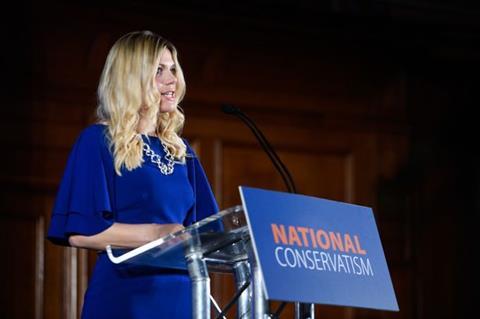The National Conservative Conference may have featured Christian voices, but it nevertheless stoked societal divisions, argues Savitri Hensman. She believes the Bible calls us to lay down our weapons and instead pursue peace

The culture wars seem to be hotting up.
The recent National Conservative Conference deepened divisions and was confusingly named.
It is part of an international movement which many in Britain who are socially conservative, regard as extreme. Speakers included historian David Starkey, who claimed that Black Lives Matter “only care about the symbolic destruction of white culture.” Meanwhile the author Douglas Murray, in defence of nationalism, remarked that “I see no reason why every other country in the world should be prevented from feeling pride in itself because the Germans mucked up twice in a century” - an insensitive way to describe the horrors of the Holocaust. Migration, experts and “elites” were all blamed for a range of ills by home secretary Suella Braverman.
National Conservatism’s emphasis on religion, especially Christianity, might feel enticing to some Christians, especially when our numbers in the UK are dwindling. Some speakers at the event were Christian, including the Conservative MP Miriam Cates (pictured, above). Her lament that women are not having enough babies, in part because of “cultural Marxism”, including universities teaching that “humanity is killing the Earth”, overlooked the practical effects of economic hardship and insecurity and unaffordable childcare. It also glossed over humankind’s responsibility as stewards entrusted with care for creation (Genesis 1:28, 2:15) and scientific truths pointing to the need to act, uncomfortable as this might be for corporate backers of this movement. Awareness of how wealth, and its pursuit, can divert humans from a better path began long before Karl Marx (Matthew 6:19-21, 24, 19:23-24).
For Christians – whether we see ourselves as guardians of tradition or at the cutting edge of progress – it can be hard to avoid being sucked in to all this, let alone act as peacemakers.
we must bear in mind our common humanity with those we disagree with
By ‘peacemakers’ I do not mean simply trying to find a compromise between opposing positions (though this may occasionally be useful) or avoiding expressing strong opinions ourselves. I believe we must bear in mind our common humanity with those we disagree with and hold on to a vision of a healed and renewed world sometimes glimpsed in the Bible, in which all can flourish and relate well.
Faithful self-giving love deserves to be celebrated, including between husbands and wives. Yet Danny Kruger MP’s claim at NatCon that “the normative family – held together by marriage, by mother and father sticking together for the sake of the children and the sake of their own parents and for the sake of themselves – this is the only possible basis for a safe and successful society” felt dismissive of single parents and others caring for loved ones in different kinds of families, in often costly ways. It also glossed over diverse patterns of kinship and care in ancient as well as modern societies, including those described in the New Testament. A number of speakers made cruder digs at minorities.
Regardless of speakers’ intentions, in this version of nationalism, large swathes of the population can be written off as marginal to the nation or even its enemies. Lone and step-parents, scientists and teachers, refugees and ethnic minorities, people who are transgender, lesbian or gay and so forth may be treated as outsiders. With battlelines drawn, checks and balances on use of power, and emphasis on being reasonable and proportionate in laws such as the Equality Act, can be too easily overridden.
It may be tempting for Christians, who like me, see themselves as inclusive to also get caught up in these culture wars - thereby making the same mistake as our political opponents. It is easy to get swept into the rhythms of combat, rather than listening attentively to different experiences and feelings, showing empathy and concern and, where appropriate, exploring the possibility of solutions which address varied needs. Some may feel too fragile at times for such conversations, especially if feeling targeted; but at least it should not be taken as a sign of virtue to be unwilling even to try to understand those with whom one disagrees profoundly.
Biases of various kinds can be hard to avoid, as scientific studies and everyday experience demonstrate. Yet branding others’ views too easily as bigotry or hatred can be unjust to them and demoralising to oneself. Those preaching tolerance can be sharply intolerant or fail to acknowledge the complex mixture of good and bad in most nations’ histories and the value of tradition.
Fostering understanding and care among those of different backgrounds, regions and opinions can seem daunting, yet is part of everyday life in numerous congregations. We will sometimes get things wrong; yet as Christians we need not rely on our own correctness but rather Christ’s self-giving love on the cross and victorious resurrection. We can draw on a rich store of guidance, including the Sermon on the Mount (Matthew 5-7), with its call to be merciful, peacemakers and to hunger and thirst for righteousness without being judgemental; warning against the temptation to treat others as targets or objects; and invitation to follow our father’s way of generous love for everyone, even “enemies”.
Instead of culture wars, through the help of a higher love, we can achieve brighter days.




































